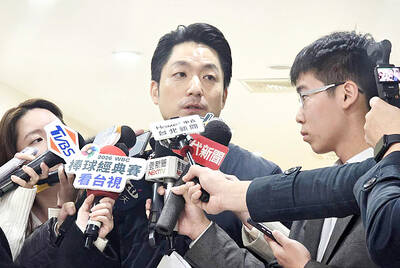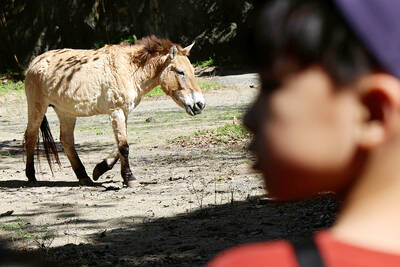The Civil Aviation Administration (CAA) yesterday said that China has so far failed to provide any information about a new airport expected to open next year that is less than 10km from a Taiwanese airport, raising flight safety concerns.
Xiamen Xiangan International Airport is only about 3km at its closest point from the islands in Kinmen County — the scene of on-off fighting during the Cold War — and construction work can be seen and heard clearly from the Taiwan side.
In a written statement sent to Reuters, the CAA said that airports close to each other need detailed advanced planning and coordination to ensure smooth operations and safety.

Photo: Ann Wang, Reuters
It said it has asked China, via existing liaison channels, to provide planning information to assess the impact of Xiangan airport on Kinmen airport.
“However, Chinese civil aviation authorities have not provided any information to us to date,” it added.
“China has an obligation to ensure that the newly built Xiamen Xiangan airport will not affect our airspace,” it said. “Prior communication and coordination are the first step to ensuring safety, and the Civil Aviation Administration calls on the Chinese air traffic control authorities to begin discussions with us promptly.”
Neither China’s Taiwan Affairs Office nor the Chinese Civil Aviation Administration immediately responded to requests for comment.
Kinmen airport mostly offers domestic flights, but has occasional international charters.
The Chinese government refuses to speak to President William Lai (賴清德), saying he is a “separatist.”
Officials have raised concerns that China could try to exert economic control over Kinmen in a key development plan that would be rolled out early next year, and see Xiamen’s airports as potential part of that plan.
Taiwan and China have clashed over flight safety around outlying islands before, including over China’s opening of new flight routes in the Taiwan Strait that the government denounced as unilateral moves likewise made without consultation.

Travel agencies in Taiwan are working to secure alternative flights for travelers bound for New Zealand for the Lunar New Year holiday, as Air New Zealand workers are set to strike next week. The airline said that it has confirmed that the planned industrial action by its international wide-body cabin crew would go ahead on Thursday and Friday next week. While the Auckland-based carrier pledged to take reasonable measures to mitigate the impact of the workers’ strike, an Air New Zealand flight arriving at Taipei from Auckland on Thursday and another flight departing from Taipei for Auckland on Saturday would have to

The Taipei City Government yesterday confirmed that it has negotiated a royalties of NT$12.2 billion (US$380 million) with artificial intelligence (AI) chip giant Nvidia Corp, with the earliest possible signing date set for Wednesday next week. The city has been preparing for Nvidia to build its Taiwan headquarters in Beitou-Shilin Technology Park since last year, and the project has now entered its final stage before the contract is signed. Taipei Mayor Chiang Wan-an (蔣萬安) said the city government has completed the royalty price negotiations and would now push through the remaining procedures to sign the contract before

The Ministry of Foreign Affairs on Thursday said the name of the Taiwanese Representative Office in Lithuania was agreed by both sides, after Lithuania’s prime minister described a 2021 decision to let Taiwan set up a de facto embassy in Vilnius as a “mistake.” Lithuanian Prime Minister Inga Ruginiene, who entered office in September last year, told the Baltic News Service on Tuesday that Lithuania had begun taking “small first steps” aimed at restoring ties with Beijing. The ministry in a statement said that Taiwan and Lithuania are important partners that share the values of freedom and democracy. Since the establishment of the

Taipei Zoo welcomes the Lunar New Year this year through its efforts to protect an endangered species of horse native to central Asia that was once fully extinct outside of captivity. The festival ushering in the Year of the Horse would draw attention to the zoo’s four specimens of Przewalski’s horse, named for a Russian geographer who first encountered them in the late 19th century across the steppes of western Mongolia. “Visitors will look at the horses and think that since this is the Year of the Horse: ‘I want to get to know horses,’” said zookeeper Chen Yun-chieh, who has been